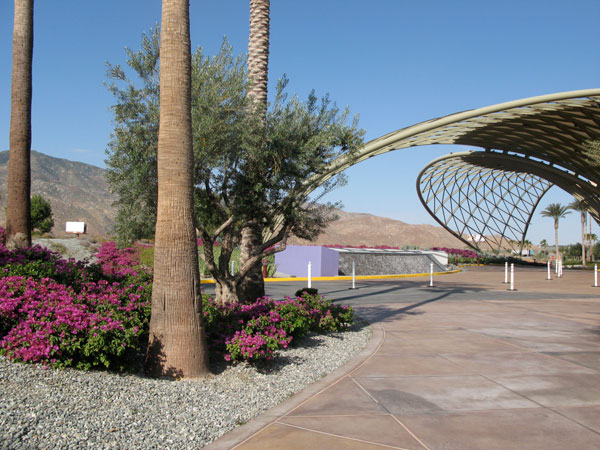
"The sporty supercharged Nissan 350Z I rented at LAX that the Hertz representative said was sure to make my wife smile—"She will smile. Show her the car. She will think you are the man."—did not make her smile, and I was not "the man." The car made her nervous. Or my driving did. But the 350Z gives me the opportunity to offer my first bit of advice as a travel writer: When in California, rent a piece of shit. You won't be driving much faster than 10 miles per hour anyway. This was true for the first three hours we spent on the freeway, but then, as we neared Palm Springs, the road opened up, the traffic thinned, and I stepped on the gas. But when the 350Z topped 70 mph, it began to shake. At 72 mph, it felt like it was going to fall apart. Just when I was cursing Hertz, the Japanese, and my younger brother (who would have given anything to drive a 350Z), we saw the new Morongo Casino, Resort & Spa rise up from the foothills of the Coachella Valley north of Palm Springs. Like a monolith. Like the Colossus of Rhodes. It was visible from 15 miles away, a solid, angular, basalt-colored spire jutting from the valley scree, looking more like an artifact than a newly minted luxury destination. It's not often that casinos can be described as beautiful or impressive, but the Morongo Tower was. I was filled with a little bit of awe. Historically, Indian reservations are a great place to be poor if you are Indian—and a fantastic place to get rich if you're not. It is only recently that this pattern is being reversed. For centuries, privateers, government officials, railroad barons, timber magnates, prospectors, and mining companies have made a mint exploiting Native land and resources while the Indians for whom reservations were created have gotten poorer and poorer. But since I am Indian on my mother's side (and come from one of the poorest reservations in the country) and white on my father's side, I had mixed feelings as I eased the Nissan up to the front door of the casino and threw the keys to the valet. ("Take care of my baby," I said, casually.) That is, since I am both Indian and white, I felt that it was quite possible that I might not be entirely screwed over. Or, to put it another way: I might just get rich. I felt the possibility that everything—our fortunes, our personalities, our prospects—might change at Morongo as soon as the doorman opened the door for us. This mad hope is what draws people to casinos and what has made a few Indians very wealthy. We stepped into the excited dim din of the gaming floor. It took us a few moments to adjust our eyes and ears before we could find the registration desk." Get the Story:
David Treuer: An American Indian's Journey in the Land of Indian Casinos (Slate 8/10)
